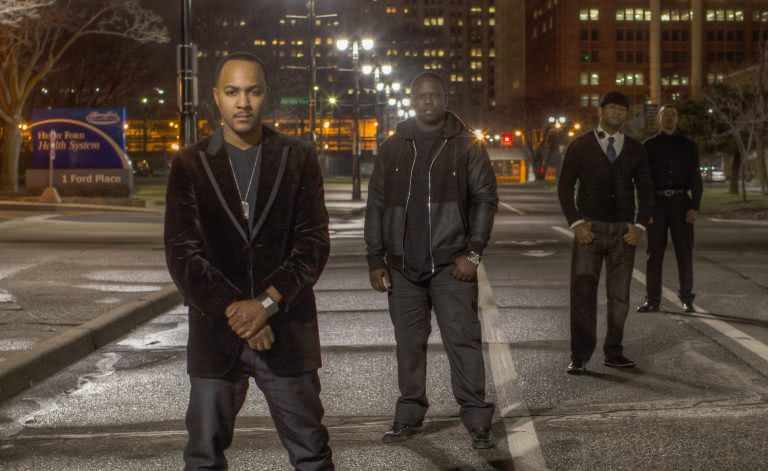How to even begin to describe the legacy of Detroit techno collective Underground Resistance in a way that does justice to the influence the group has had over the course of 25 years?
Read through the names associated with the ever-changing collective – Jeff Mills, Mike Banks, Robert Hood, Drexciya – and you could be forgiven for assuming this was some kind of techno hall-of-fame list, rather than a collection of subversive, politically incisive artists. Most notorious and well-loved for their anti-mainstream business ethos, radical politics and dedication to bringing Detroit’s vibrant musical spirit to the rest of the world, anything Underground Resistance is going to be defiantly uncategorisable – exploratory adventures through the worlds of jazz, experimental, techno and beyond, both on record and across the world’s stages. Australia will be lucky enough to bear witness to Underground Resistance’s Timeline show in November, and keyboardist Jon Dixon takes us through what to expect.
An accomplished keyboardist and music teacher, Dixon’s background is rooted in the more traditional. His introduction into the UR collective was almost a coincidence. “Back in 2007, a bandmate [De’Sean Jones] had a jazz gig and had a saxophone hooked up to different vocal effects and our current manager, Cornelius Harris, happened to be at the club that night,” he explains. “He approached De’Sean, and asked him if he was into experimental music, he said ‘yes’. He asked him if he knew any keyboard players that learn real quick – ‘Yes, I know just the guy!’ This wasn’t the first time I heard De’Sean mention something about travelling overseas, so I didn’t trust him! I was like, ‘Have them call me,’ and so I got this call from Mike Banks a couple of days later telling me to come by. He sent me down with a keyboard, told me to play something, and about ten seconds later, he was like, ‘Alright, go downstairs and talk to the manager, we start rehearsals tomorrow.’ Two weeks later I’m in Switzerland doing the Montreal Jazz Festival with Galaxy 2 Galaxy.
“What’s crazy is back in middle school, they used to play a lot of techno on the radio on Friday nights. I’d go down to the corner store and buy tapes and record them, make my own mixtapes. Some of the songs that would come on the radio, I didn’t know a lot of them were made by Underground Resistance – I wasn’t sure who made them. I just liked the music. I guess you could say that was my early introduction to it.”
The often disparate worlds of jazz and electronica don’t intuitively seem ripe for crossover, but Dixon argues differently – that ultimately, the two are same in their ethos and practice. “Back in the early 1920s, big band music was dance music,” he says. “Compared to later in the bebop era, where you have Charlie Parker and John Coltrane playing all these notes and fast licks and whatnot, there wasn’t too much of that going on in the early 1900s. It was simple enough, but there was enough music in it, and people dancing to it … First and foremost, with Timeline, we want to make you dance. But at the same time, we are also musicians, so we get the chance to showcase what it is we do as musicians and break down those barriers.”
The melting pot of influences and a vibrant, adventurous spirit are the crucial characteristics that keep the global music scene’s eyes on Detroit – a tradition that continues to enamour Dixon. “Musically, it’s great,” he says. “Especially for young and upcoming musicians – one of the things I really admire about the young ones is that they have so much access to what is new in technology and access to all these great mentors, it’s crazy. I used to be one of those kids, looking for someone older to kind of show me the ropes ten, 12 years ago, and now I’m one of the ones showing those 18-year-olds different things. These kids are really smart musically, they understand their theory, and more importantly, they have open minds.”
Dixon’s role as a curator of young talent is one he looks forward to sinking more of his time into, even in the midst of an impressively packed-out touring schedule with Underground Resistance and others. And what to expect in November? Nothing but the unexpected. Dixon may have taken on the role as musical director of the outfit, but he’s realistic – with a group whose philosophy tends towards musical anarchy, who knows what could go down?
“I do have a certain number of responsibilities, but at the same time I know my band and the members and their strengths,” he explains. “I try to format the show so that it’s different and every member gets a chance to use their strong points, but not overuse them for the entire show. We play some of the Underground Resistance classics that everybody knows; I try to do something a little different that people don’t know. I try to have a section where we get the chance to really experiment, and find something really special in that moment while onstage. And not many people can do that – with this style of music, it requires very huge amounts of improvisation and musical knowledge and the ability to trust your other bandmates and say, ‘Hey, let’s try something, and if it works it works.’ It’s a cool thing to be able to trust the other guys and do something new – it’s one of the fun things about this group.”
See Underground Resistance: Timeline attheImperial Hotel, Erskineville onSaturday November 15, tickets online. They also play a Melbourne Music Week event at Queen Victoria Market on Tuesday November 18.


































